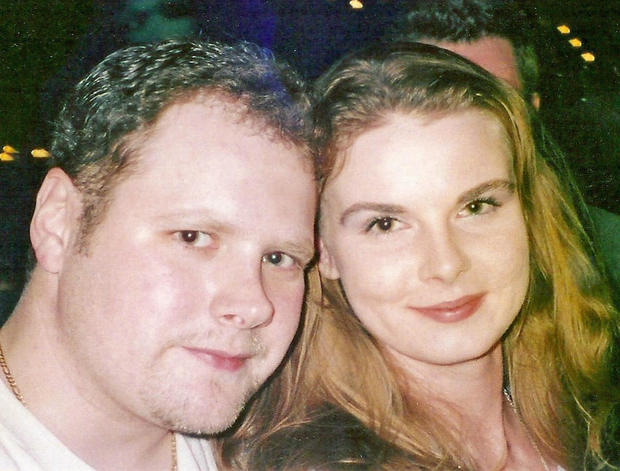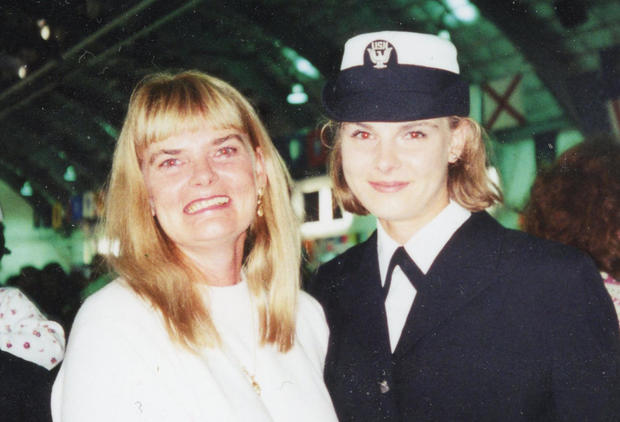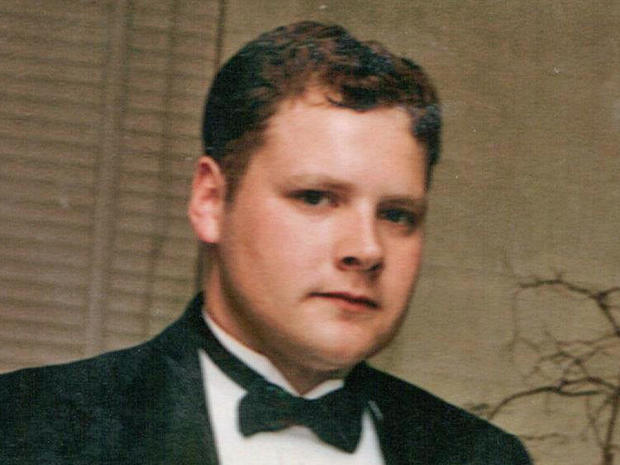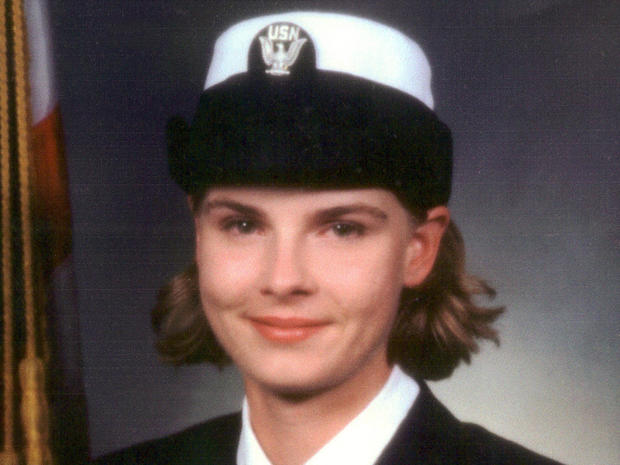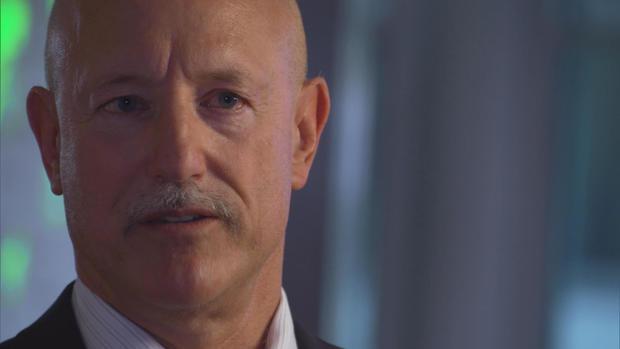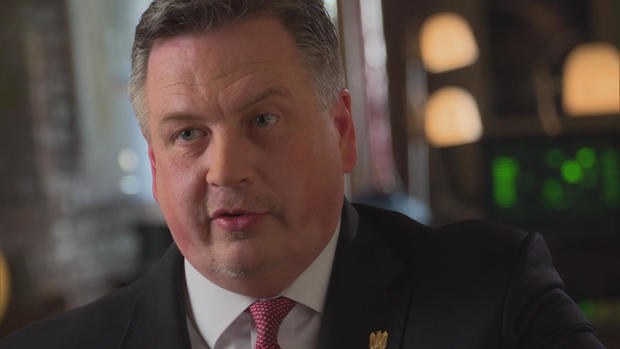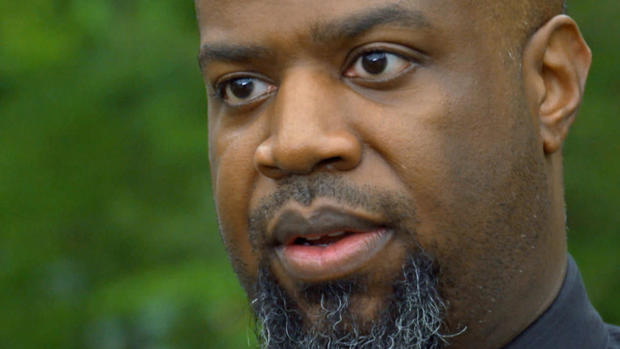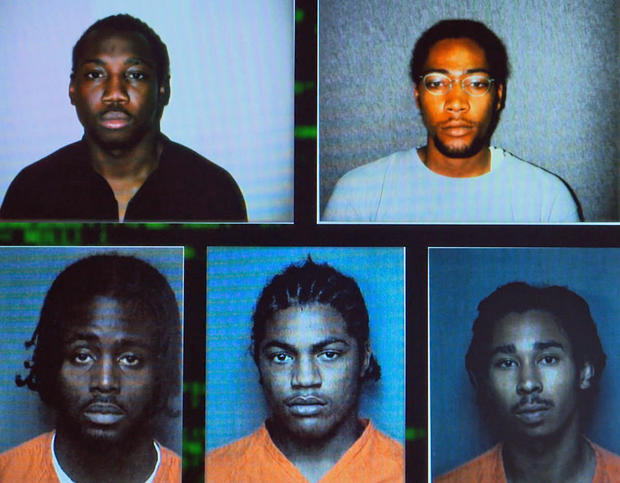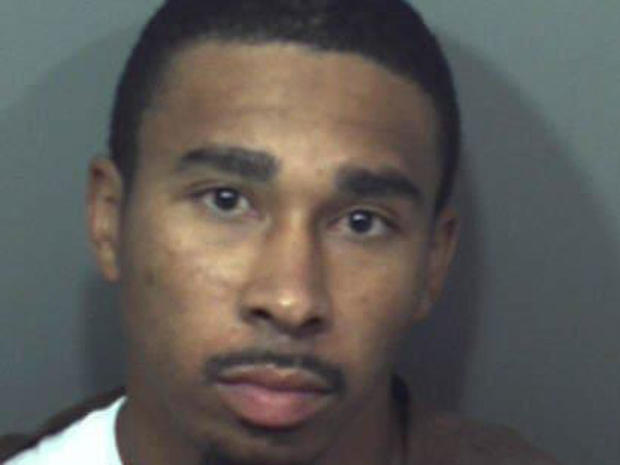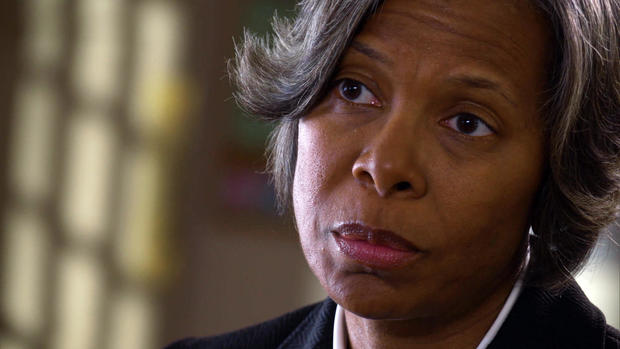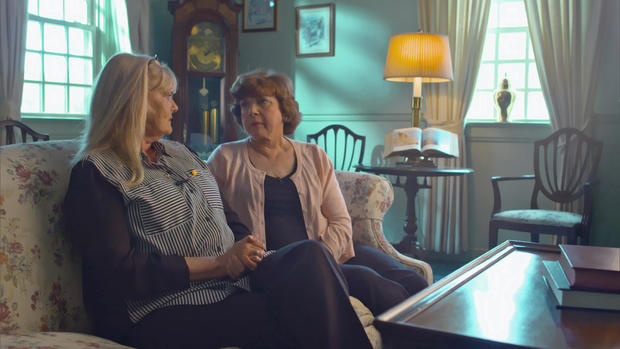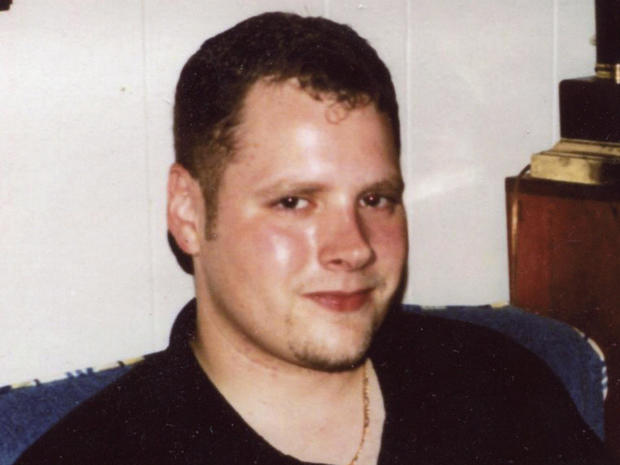"48 Hours: NCIS:" One of Their Own
Produced by Paul LaRosa
In June 2001, the bodies of Navy Petty Officer Lea Anne Brown and her friend Michael Patten, a bank employee, were found in the woods off a rural road in Accokeek, Maryland. Both had been shot twice in the head. They appeared to be targeted murders -- but why? Neither had any connections to any criminal activity, and there wasn't anything else that would make them obvious targets of such a vicious crime.
"A missing sailor for one day is not a felony case … but I had 20 years of experience and a gut instinct told me there was something there. Don't ignore this," said retired NCIS Agent Chuck Alderman.
The agents of NCIS were committed to solving this murder of one of their own and her friend, working with detectives from the Prince George's County Sheriff's Office.
What would it take to find the killer?
Agent Chuck Alderman | NCIS, retired: We had gotten a duty call from Lea Anne Brown's chief petty officer. …. Because Lea Anne Brown had not reported to work and had not called her chief petty officer to say, "I'd be late," or, "I'm gonna be sick--the chief thought this was very unusual and notified NCIS.
Agent Chuck Alderman: This case initiated in June of 2001. A civilian … had … noticed two bodies laying a short distance off the road in the woods in Prince George's County.
Det. Jacqueline Broadus | Prince George's County, retired: I remember clearly, it was a Sunday afternoon, bright and sunny, warm outside …We had no idea of any information …we just had two unidentified bodies in the woods.
Det. Jacqueline Broadus: All we knew, we had a white female and a white male … shot execution style … within 12 inches …from their head.
Agent Chuck Alderman: Prince Georges County was at a loss. On the other hand, NCIS had a missing sailor.
Cari Freemore | Lea Anne Brown's mother: Lea was the light of my life, my only child … we would IM every morning and say hello. This particular Monday morning I IM'd her and she never got back with me and I waited a little while and then I finally called her captain and they told me they felt she was missing…
Margery Patten | Michael Patten's mother: …Sunday evening, our older son Mark called and he said … "I have to tell you that something strange is going on …Michael is missing …And … Lea is missing also."
Margery Patten: I said … "Mark did they identify those bodies that were found in Accokeek?" I said "Is that what they think?' and he said, "Maybe." …we drove home with this horrible cloud hoping that this wasn't true but knowing deep down … that it was. It just couldn't be happening but it was…
Det. Jacqueline Broadus: Bit by bit, we were … really realizing that it probably was Michael Patten and Lea Anne Brown. …Being shot execution style is more personal and so now it just heightens – OK, what was going on? Why were they shot in this manner?
TARGETS FOR EXECUTION
Agent Chuck Alderman: This case was a very high priority for us. Fortunately, NCIS does not get homicides, especially double homicides, every day … So when we do get one, we take it extremely seriously.
Agent Frank O'Donnell | NCIS, retired: I wanna let you know that as many agents as you need, I will give them to you. So if you need five agents, you've got it. If you need 10 agents, you got it. If you need 15 agents, you got it.
NCIS Agent Frank O'Donnell: We wanted to do everything we could to find the killer … this crime was up close and personal.
Prosecutor Bob Dean: As serious a case as it was, a lot of resources were poured into retracing their steps. …well, what you try to do is … work backwards … and find out, one, when they were last seen alive, who they were with, what they were doing…
Det. Jacqueline Broadus: Because this investigation just was so broad, and we didn't have any information … we needed to chase down as many leads as possible.
Prosecutor Bob Dean: …these were … regular folks. She was in the -- Navy, worked in the Washington Naval Yard. And Michael worked at Riggs Bank, a very prominent bank in the Washington area. And then, they were acquaintances; they were friends … and they were spending … a fun evening together … they weren't what you would consider -- targets for execution.
Agent Chuck Alderman: Michael Patten was … a friend of Lea Anne Brown's boyfriend. Lea Anne Brown's boyfriend had to work that particular night in question. So he asked his buddy, Michael Patten, if Michael would take Lea Anne to a nightclub that night … Michael Patten agreed and that's how they were together that night when the crime occurred.
Det. Jacqueline Broadus: …friends had actually seen them Saturday night in the club, Lulu's Club.
Prosecutor Bob Dean: Mike and Lea Anne were … were doing what any young couple would do. They would enjoy themselves on a Saturday night and drive home.
Det. Jacqueline Broadus: Michael Patten's family was local so it was easy to be in communication with them, to go to their home and speak with them…
WUSA report: Margery Patten, Mike's mother, [June 2001]: Someone that could do such a terrible thing needs to be caught. How could anyone be so cruel to another human being?
Margery Patten [Today]: I just cannot imagine anyone being so cruel to other people for no reason.
Det. Jacqueline Broadus : We were able to ascertain from the family that he actually lived in Waldorf, Maryland, so … that would give us an explanation of why he was found in Accokeek because he was actually on his way home from the club.
Margery Patten: Michael was the youngest of our four children…Michael was very fond of his niece and nephew… His niece … when she was born, she just really became the apple of his eye.
Mary Kauffman | Mike Patten's sister: How do you tell a 6-year-old that her beloved uncle has been murdered? ...So I told her the truth … he'd been hurt by some bad men and he had died and she was very, very quiet. She just really didn't say anything and she went upstairs. …when she did come down she brought this box with her.
Mary Kauffman: She wanted me to have this because it was going to help me get through this.
Mary Kauffman: The most important things … are the notes on top and that's her advice on how to get through this. And she has that I should make a model of Mike, and make a silly song about Mike. …her final thought was "but you should be mostly brave."
Mary Kauffman: I think of my life as before Mike's death and after Mike's death … I went into a deep depression and I had a very hard time functioning.
Andy Patten | Mike Patten's brother: I fell into a bottomless pit … I was self-medicating, drinking nonstop.
Andy Patten: My mother handled it probably the strongest of all the members of our family …I think she understood what I was going through a lot better than anyone else did. …I would come in after drinking … and we'd just hug in the hallway and both of us just cry.
Mary Kauffman: I'm very proud of my mother in the way that she has handled this.
And Margery drew some of her strength from Lea's mother, Cari Freemore, who had been living in California when she was informed of her only child's death by a special detail of Naval officers.
Cari Freemore: They did come in and they did explain to me that Mike and Lea had been murdered and … I guess during that week is when we started talking.
Cari told Margery it was her idea that Lea join the Navy.
Cari Freemore: I just felt she was missing something and I just felt that that structure …it just really might help her and as it turned out, it did.
Cari Freemore: Since she graduated first in her class in A school, she got to pick where she wanted to go and she chose D.C. …she was so excited because she was gonna be working for an admiral … she just loved it. She was just having a great time.
Cari Freemore: I was extremely proud of Lea, but hearing how proud she had become of herself was all I ever needed.
Agent Chuck Alderman: During the initial search of Lea Anne Brown's barracks and records checks, personnel interviews over at the barracks, we found that there was a sailor who had a romantic interest in Lea Anne Brown. He had a spotty record, at best, had already been discharged from the Navy. He had actually come back and stayed in a local hotel room and had attempted to contact her.
Cari Freemore: And so they … traced the call. They found out where he was and he called from a motel so they rushed over there. And by this time, he had already left.
Det. Jacqueline Broadus: When what we learned was that he had an interest in Lea Anne but she didn't have an interest in him, so now that's a red flag for us. OK, you were here, you were calling, now you've gone outta town so we need to find out where you were at the time of the murders.
Cari Freemore: There was never a doubt in my mind that the NCIS was not going to find Lea's killer … They told me that she was one of their own and they would find them and make them pay for what they had done to my daughter.
IN SEARCH OF A KILLER
Agent Chuck Alderman: I have thought long and hard about the criminal cases that I and my colleagues have investigated. Every one of them is a tragedy … not just the victims, but family, friends, others that are hurt by these crimes.
Agent Chuck Alderman: Oftentimes, they don't seem to make any sense at all.
In June 2001, NCIS was trying to make sense of the murder of Petty Officer Lea Anne Brown and needed to track down an ex-sailor who had a crush on her.
Cari Freemore: Lea had mentioned him a couple of times as just being a friend. I think maybe he wanted to be more than friends, but she did not.
Agent Frank O'Connell: We found that he had, shortly after the homicides took place, had moved to … Yuma, Arizona … I asked the agent there to … interview him … But he denied having any knowledge of the homicides.
NCIS eventually cleared the ex-sailor and the investigation shifted back to Maryland.
Det. Jacqueline Broadus: There was a phone call that came into the office from a pastor at Fort Washington Methodist Church, indicating he found blood in the parking lot … it didn't look like animal blood-- and there was a good amount of blood … we were able to learn that that church was actually the Patten family church.
Margery Patten: We were members of that church for -- 40 years. And we attended regularly.
Det. Jacqueline Broadus: Well this is another twist in the case, because it doesn't make sense. Why would they have stopped at that church?
Det. Jacqueline Broadus: At the same time they we were heading down there, we received a call that a suspicious vehicle had been sitting in this neighborhood for a few days. Well, it turns out that it was actually Michael Patten's vehicle … After the vehicle was recovered it was taken back to our evidence bay.
Det. Jacqueline Broadus: …the evidence technicians … were able to locate in the … driver's side door, Michael Patten's wallet.
Det. Jacqueline Broadus: They were able to find one fingerprint on the rear view mirror … but it wasn't an immediate identification … They said, "If you give us a name, we can match that name with what we have … on file."
Det. Jacqueline Broadus: They were able to determine that there was blood actually on the outside of the car that had been wiped down, and there was a lot of blood in the trunk of the vehicle. …
Det. Jacqueline Broadus: There's blood in the parking lot … and there's blood in the trunk of the vehicle … pieces are startin' to come together now. We have the vehicle ... we've identified who each -- victim is. So now we just need to put more of the pieces of the puzzle together.
Special Agent Jay Doyle | NCIS: I was given the responsibility of running the credit card records … for both victims.
Special Agent Jay Doyle: We were looking at their credit card -- history to, kinda, give us a timeline of what happened … NCIS noticed that morning … Lea Anne's credit card … was used at a gas station. Then it was used to rent a video. And then it was used again at -- the grocery store, but it was unsuccessful. So it turns out that it was a female who had possession of the credit card.
Det. Jacqueline Broadus: She now decides, since she can't buy groceries with Lea Anne's card, she's now gonna use her own personal card.
Det. Jacqueline Broadus: So now we have to see, who was this person that's got Lea Anne's credit card?
Special Agent Jay Doyle: We had a video of a female using her card and she had pulled a different card out to pay. So that gave us a name at least to go and investigate to see if that was the same person we saw in the video.
Det. Jacqueline Broadus: At this point, she now becomes a suspect.
NCIS obtained a search warrant.
Special Agent Jay Doyle: We were able to interview the woman after we conducted the search. And once she found out we were conducting a homicide investigation, she was very quick to tell us that she had stolen the credit card. She initially had said that she was borrowing it and was gonna give it back … she was very quick to deny any involvement in any way in the murder. She said… she knew Lea Anne, but she had no interaction with her after they left the bar.
Agent Doyle zeroed in on a second hit on Lea's bank card used that morning at an ATM in the Washington D.C. area.
Special Agent Jay Doyle: So we went to that bank, got that information, and what we saw was … a blurry picture. But we could make out it was a male wearing a -- mask of some sort, making the withdrawal.
But after using Lea's card to take out $20, the man in the mask then used four other bank cards in his possession, all belonging to someone named William Hicks.
Det. Jacqueline Broadus: We now have to find out who William Hicks is.
CONNECTED CASES?
Hours before Lea Brown and Mike Patten were murdered, a man named William Hicks was carjacked and NCIS believed there could be a link.
William Hicks: I'm driving home from picking up my car … from Woodbridge, Virginia … driving into my development at around, like, 1 or so in the morning, OK. So, I notice lights behind me. And I don't think anything of it. Because people are always comin' and goin' at all times of the day.
William Hicks: I get to my stop, I park … I notice there are people walking towards me at that particular point … I did not think anything of it. …I had one person who was already down the street … I'm getting my keys, locking up, and he's, like, about maybe 20 feet from me. And he's comin' up on me fast. And then, I notice the gun.
William Hicks: I'm amazed … This guy is … about 5'4," 5'5," small. He's comin' up on me… And, you know, I'm a fairly big guy. So, he's walkin' up on me so fast. I'm like, "Are you gonna try to, you know, stick this gun right in my face?"
William Hicks: And I started walkin' towards him-- probably the stupidest thing I probably coulda done. But he starts to back up. And then, I see the three other people. …And they're comin' at me. And they all have guns, too, and masks on 'em.
William Hicks: The first criminal outta the car asks me, "where's the money at?" I'm like, "there's no money. All I have is credit cards. Here take it." I drop my keys in the lawn.
William Hicks: Thank goodness the neighbor's lawn wasn't mowed 'cause they couldn't find that right away. They're like, 'pop the trunk'. I popped the trunk. I'm like, "Take whatever you want." They're like, "No. Get in the trunk." And I'm like, "OK."
William Hicks: So, if this is, like, the -- the trunk area of the car and the -- the hood's up this way, you know, they're like this. And they're like, "Get in the trunk." I'm like, you know -- I'm not sayin', "No." I don't verbally say that. But in my head, there's no way, you know, I'm doin' that. …they literally tried to put me in the trunk of my car. At that point, I'm dead. I figured, "That's it." It's funny. Because things really slow down and get real fast at the same time. I'm processing everything. I'm sure it was only, like, half a second or so. But it seems like that time lasted forever for me, to make a quick decision.
William Hicks: And the decision that I made was, "I'm dead. I'm gonna die here. I'm not gettin' in the trunk of that car. …Neighbors will find me. And then, you know, my family will have some peace of mind."
William Hicks: I said a quick prayer to God … And then, I get hit here. I bounce off the-- the passenger corner of the trunk. 'Cause he hit me pretty hard. And thank God I-- that didn't knock me out.
William Hicks: And I kinda, like, rolled, kinda just -- it's funny how adrenaline kicks in. I'm rollin'. And then, I'm gone. … cuttin' through houses, bangin' on my neighbor's back door. Then, I hear them coming. And then, when I'm startin' to run past there, that's when I hear the two shots.
William Hicks: Two loud cracks, like, "Crack crack."
William Hicks: …jumpin' over a neighbor's fence, bangin' on the back door-- s-- yellin', "Help me," as loud as I can, tryin' to draw some attention to the situation. I hear them comin' after me. …honestly, I don't even know where I went. … cut through somebody else's yard. You know, the adrenaline's hitting. … Gashed my leg open -- over a brick wall, I think. And then, you know, I'm hiding behind a couple of neighbors' houses.
William Hicks: I'm banging on doors, tryin' to get some help, tryin' to get some attention … I'm hiding behind a house. … I'm like, "Call the police, please, you know. Can I come in, you know, please?" They're like, "No. But, you know, we'll call the police for you."
William Hicks: And then, I hear my car and-- my car at the time had a busted exhaust. So, I -- I know it's my car when it's goin' on. So, I hear it. And it's just taking off. So, they -- they took my car off. I'm waiting. It seems like an eternity at that point. 'Cause, you know, I'm just full of adrenaline. But thank goodness, I hear that. And I'm figurin'-- I start to calm down a little bit.
William Hicks: When I realized that my leg was split open, I almost thought that maybe I had gotten shot or grazed or somethin' like that. Because it -- it was almost down to the bone. There was 21 stitches. But, you know, that's -- that's nothin'. That's a scratch.
Prosecutor Bob Dean: There were a number of pieces that …kind of fell together in a relatively short period of time … One key link is that, when Lea Anne's credit card was used at the ATM machine for the withdrawal in Washington, at about 5:00 in the morning … a credit card of William Hicks was, at the same time, and the same person used in an attempted-- withdrawal. … that obviously created a -- connection-- between the -- these two events
Det. Jacqueline Broadus | Prince George's County, retired: …there was-- a connection there, because now his credit card is used at the same time as Lea Anne's. So now we have to find out maybe the suspects, the same suspects that -- did this carjacking are probably the same suspects that did our murder.
William Hicks: I went to – the -- the police department. And they showed me a book of possible suspects. And I flipped through a few of them. …I still remember the page. Because there was … the first page … flipped over, he was on the lower left-hand side. And there was, like, you know, four per line. He was on the lower corner.
William Hicks: …he didn't have a mask on … he was the one that I was able to identify. Because … 5'4," 5'5," skinny, cowardly, you know, light skinned. I think he had dreadlocks or braids or something at the time. He was the one that I was able to pick out. …It was -- I believe it was -- Cortez Carroll.
Det. Jacqueline Broadus: And so now we have a name … associated with -- this carjacking.
But Detective Broadus believed Carroll also was involved in the murders of Mike and Lea, and a phone call soon cemented her suspicions.
Det. Jacqueline Broadus: I remember we got a call in our office-- indicating someone, of course, they didn't give their name, saying, "I know who committed the murders." And Cortez Carroll, his name was one of the names given in the murders … And I believe the other name … they said was Robert Odum. …so now we have to identify these people, find out where do they live? And then we determined they're all within the same radius of where all of these incidents happened in Fort Washington.
Det. Jacqueline Broadus: Let's take the name Cortez Carroll and Robert Odum and give it to the fingerprint examiner and see if maybe that is one of their fingerprints. And it turned out we got a hit for Robert Odum.
Prosecutor Bob Dean: There were three arrests that were made first … Cortez Carroll, Marco Scutchings-Butler, and Robert Odum.
Prosecutor Bob Dean: And then, as a result of the statements and piecing together what it is that the police learned from these three individuals, Aaron Hollingsworth was identified as also being involved, and Eric Thomas. So, we now have our five… all the statements were consistent with regard to who was actually there, in the church parking lot, and who was actually in the car after the beatings occurred, and who took these individuals to Accokeek.
Det. Jacqueline Broadus: We were gonna go and backdoor them, start off with the carjacking and see if they will admit to this murder.
Agent Chuck Alderman | NCIS, retired: The morning after Prince George's County had arrested all five suspects … Jacqueline Broadus called me at home. She asked if I would come immediately to Prince George's County Police Department … Some officers were escorting Cortez Carroll down the hall. Orange … jumpsuit, cuffs, leg irons. I walked past him, within three feet of him. ...Just an aura of evil surrounding that individual. It was so strong, I could feel it. I have rarely felt something like that before in my life.
"BENT ON EVIL"
Agent Frank O'Donnell | NCIS, retired: What really hit us hard about this was that Petty Officer was … in the U.S. Navy. She was a model sailor … She was … on the same base as we were … so this really hit us hard. … there was a real sense of outrage in the office.
Two weeks had passed since Lea Brown and Mike Patten had been murdered and now Jacqueline Broadus was about to face off against 22-year-old suspect Cortez Carroll. He and the other suspects readily shared the horrifying details of what happened the night of the murders.
Det. Jacqueline Broadus: I don't know why he started talking … and admitting to the carjacking and then admitting to the murder. … I was -- you know, not concerned why you were doin' it. Just the fact that you're giving me this information, and I know that you can't have these details unless you were at the scene.
Prosecutor Bob Dean: It was … a loose-knit group of young men who were bent on evil ... they sat on a wall and shared some weed together.
Agent Chuck Alderman: Lea Anne Brown and Michael Patten stopped in that church courtyard simply for the reason that Lea Anne Brown had to relieve herself.
Prosecutor Bob Dean: It was probably, in his mind, the safest place to go.
Det. Jacqueline Broadus: "This is a pit stop… so let's just stop here and go to the bathroom."
Lea got out of the car as Cortez Carroll and four friends watched from the shadows, ready to pounce.
Prosecutor Bob Dean: Lea Anne and Michael were approached by five individuals, and … the rest is the nightmare that occurred.
Agent Chuck Alderman: …she begged for her life … they demanded her credit card and her PIN number.
Det. Jacqueline Broadus: …just saying, "Just take my ATM number, take my ATM card, I'll give it to you, just leave us alone, let us go." …and they wouldn't. So they beat them practically unconscious.
Cari Breedlove | Lea Anne Brown's mother: They beat Lea so bad that I -- I could not say goodbye to her.
Prosecutor Bob Dean: They were stuffed into the trunk of Michael's car.
Det. Jacqueline Broadus: Lea Anne, they could hear her screaming in the trunk, pleading for her life. They drove 'em down the road -- down to Accokeek … dragged them … into the woods. Had them on their knees, and then shot 'em senselessly execution-style.
Det. Jacqueline Broadus: Cortez Carroll is the one who actually shot Lea Anne Brown execution-style.
Prosecutor Bob Dean: From everything we were able to piece together, Cortez Carroll was the most culpable … and the statements of his compatriots also put him there as the shooter of Lea Anne Brown.
Det. Jacqueline Broadus: None of the suspects actually ever admitted to shooting Michael Patten.
Det. Jacqueline Broadus: In all the murder cases that I had, no one was ever, you know, shot execution-style … it was just random acts of violence that they did that night … it was just heinous.
Prosecutor Bob Dean: Among the many murder homicide cases I've had, it's one of the more terrifying for sure.
Margery Patten | Michael Patten's mother [In tears]: I think about that agony, the agony that they put them through … My child was choking in his own blood and they were laughing. Sorry, sorry.
Mary Kauffman | Michael Patten's sister: I personally had a lot of anger … enraged over the whole thing. …the outrageousness of it … that somebody just made the decision to take two lives, the enormity of it.
Andy Patten | Michael Patten's brother: And I can't stand …. the way the media says, you know, "In a robbery gone wrong." It was not a robbery gone wrong. You know? It was a murder gone right. Their intention that night was murder.
Only hours earlier, William Hicks had made a narrow escape.
William Hicks: They chose to go back and attack two other people who were also enjoying their evening … and to prey upon them … they were heroes for each other. They protected each other … Michael's not gonna leave Lea. And Lea's not gonna leave Michael. …And I know that in my heart.
Prosecutor Bob Dean: These five individuals lived in the area and it's not a depressed area by any stretch of the imagination. It's a basic middle class neighborhood in Fort Washington, Marylan. II don't know. I don't know that anyone knows or can put together a calculation to explain, you know ... what actually drove these fellows to do what they did.
As the cases headed to trial, the evidence appeared strong.
Margery Patten: We thought that they had all the evidence. It was just a matter of going to court and getting a guilty verdict. We found out that that is not true.
"SHOCKING" VERDICTS
As the homicide cases against the five alleged killers of Navy Petty Officer Lea Anne Brown and Mike Patten moved through the courts, the victims' mothers sat front and center.
Margery Patten: We attended every -- pretrial motions hearing and any other thing, just hanging on piecing this together and … trying to make a story of how this-- how this had happened.
Margery Patten: Robert Odum's was first. And when I walked in, apparently his lawyer told me he told him that he recognized me. I had been a substitute teacher at his middle school. And he thought I had come to support him. He told the lawyer, "That's my teacher." … And then realized why I was there. And as he walked out, he was in shackles. But he did look down at me and said, "I'm sorry, Mrs. Patten."
Prosecutor Bob Dean: Robert Odum admitted being there in his statement to the police. But he did not indicate that he did any of the shootings.
Det. Jacqueline Broadus: So the case was progressing, and now it's gone to the jury. I remember clearly, it was a Friday night … they excused me to go to the juror's house to get their medication. I'm coming back into the courtroom. … And I'm hearing, "Not guilty, not guilty, not guilty." And I'm wondering, "Am I even in the right courtroom?" Because this can't be happening. And he was found not guilty on all charges, except for—kidnapping.
Det. Jacqueline Broadus: I was shocked, I was stunned. I think everyone -- on the prosecution side was shocked and stunned. The families were shocked and stunned … it was unbelievable.
Margery Patten: Robert Odum's fingerprints are the only fingerprints that were found anywhere on Mike's car and they were on the -- rearview mirror. So obvious -- he had driven the car and adjusted the mirror. With all of this evidence, we were shocked that the jury came back with so many not guilty … decisions.
Det. Jacqueline Broadus: We found out that there was-- a juror that … they said to the other jurors, "It doesn't matter what you say, I'm gonna find him not guilty on all charges."
Margery Patten: This juror said to the others that she did not want to send one more young, black man to jail. And so, that's why she held out for a not guilty verdict.
Margery Patten: …all of the other jurors said, "We can't let this guy go -- because this is a terrible crime and he's obviously quite guilty." And one juror, who held out said, "Oh, well, pick one charge," and she'd go with it. They said, "What about kidnapping?" "Yes." She said she would agree to that. So that's why he was only convicted of the kidnapping charge. But what she didn't know is that that held 30 years for each victim. Thirty for Mike and 30 for Lea.
Eric Thomas was tried next. He was convicted of both murders and sentenced to life in prison.
Aaron Hollingsworth received a 30-year prison sentence in exchange for his testimony.
Cortez Carroll, who had confessed to shooting Lea, faced the death penalty but pleaded guilty in exchange for a life sentence.
And that left Marco Scutchings-Butler.
Prosecutor Bob Dean: Well, Marco Scutchings-Butler did not give much of a confession. He said he was, you know, involved and there. He was a juvenile at the time. Actually, he turned 18 the day after the murder. His confession, as written, was … I don't want to say the term, "illiterate." But it was … clear that he … was not able to write and communicate well.
Butler was acquitted of the murders.
Cari Freemore: Each time they read off a count and said not guilty, you know, your heart just sank a little bit more, a little bit more. …And by the last "not guilty," I couldn't take it. And I just stood up and screamed and ran outta the courtroom … "they let him go, they let him go…"
But Scutchings-Butler still faced charges in a separate trial -- the carjacking case against William Hicks. Hicks was just itching to take the stand.
William Hicks: I'm going to gladly, to testify against him for my carjacking.
William Hicks: He's staring at me. I'm staring right back at him, at -- you know, he's not gonna back me down, you know. …we're just staring at each other, makin' eye contact the entire time.
William Hicks: I told the jury what happened to me … And thank goodness he got, I believe 25 years or somethin' like that for the carjacking.
In fact, Scuthings-Butler received a 35-year sentence.
Prosecutor Bob Dean: I've thought about this case a bit … and really, there are no lessons to be learned in this case. Mike and Lea Anne were doing nothing wrong … It's just the danger of society … And it's totally random … and that's what makes it frightening.
Agent Frank O'Donnell: To this day, I still remember this case. This was an important case … This is a great example of cooperation between agencies.
Agent Frank O'Donnell: As we were finishing our work in the case, I received in the mail -- at the Washington field office -- a letter from Cari Freemore, Lea Anne's mother … it was handwritten. And it was really unsolicited and very touching:
"To Mr. O'Donnell and all the agents that worked on my daughter's case, you will never know how much my husband and myself as well as my whole family appreciate the superb job you all did in investigating and bringing Lea's case to a close … Lea loved the Navy and was proud to be a part of it. Thank you very much. Sincerely, Jerry and Cari Freemore."
Cari Freemore: I want people to remember Lea for the kind person that she was … Anyone that you would talk to would tell you that Lea was just a jewel.
Margery Patten: I want people to remember Michael for the -- the good guy that he was. He was well-liked by his friends … he was a good son … he was a good person. And he would do anything for you.
The next episode of "48 Hours: NCIS" airs Tuesday, May 30 at 10 p.m. ET/PT on CBS.
